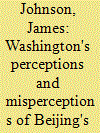| Srl | Item |
| 1 |
ID:
116109


|
|
|
|
|
| Publication |
2013.
|
| Summary/Abstract |
The downfall of David Petraeus sent such shock waves through the policy establishment when it hit the news in November because the cause was so banal: the most celebrated and controversial military officer of our time compelled to resign from his dream job as CIA director as the result of an extramarital affair. Yet long after the headshaking details are forgotten, Petraeus' larger significance will remain, as his career traced one of the era's crucial strategic narratives -- the rise and fall of counterinsurgency in U.S. military policy.
|
|
|
|
|
|
|
|
|
|
|
|
|
|
|
|
| 2 |
ID:
117413


|
|
|
|
|
| Publication |
2012.
|
| Summary/Abstract |
FROM THE BEGINNING of this century, the United States administration led by President George W. Bush Jr. began to pursue a more vigorous policy in the post-Soviet space in terms of the realization of its objectives there. Among other things, it included creating, through transatlantic partnership, a foothold on the Eurasian continent that would make it possible to advance into the depth of former Soviet territory, as well as to shape a sort of cordon sanitaire from the post-Soviet republics surrounding Russia.
|
|
|
|
|
|
|
|
|
|
|
|
|
|
|
|
| 3 |
ID:
152090


|
|
|
|
|
| Summary/Abstract |
Washington has become increasingly concerned that Beijing's anti-access area-denial (A2-AD) capabilities will put at risk US military assets and forward forces operating in the Western Pacific region, enabling China to deter, delay and deny US intervention in future regional conflict and crisis. US defence analysts in their assessments have frequently, and often erroneously, conflated a Chinese operational capability with an underlying strategic intention that conceptualises the United States as its primary (if not sole) target. The central argument this article proffers is that US perceptions of A2-AD have been framed by specific analytical baselines that have overlooked the evolution of Chinese operational and doctrinal preferences, and over-reliant upon military material-based assessments to determine Beijing's strategic intentions, and formulate US military countervails. The article concludes that the strategic ambiguities and opacity associated with Chinese A2-AD capabilities and its ‘active defence’ concept reinforced Washington's reliance upon capacity-based assessments that in turn, exacerbated misperceptions confounded by cognitive bias of Chinese strategic intentions. The critical framing assumptions of this article draw heavily upon the ideas and rationale associated with the international relations ‘Security Dilemma’ concept.
|
|
|
|
|
|
|
|
|
|
|
|
|
|
|
|